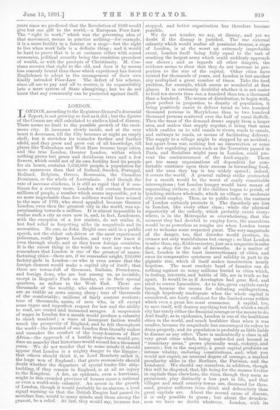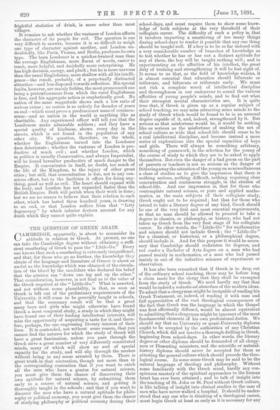LONDON. L ONDON, according to the Registrar-General's decennial Report, is not
growing so fast as it did ; but the figures of the Census are still calculated to strike a kind of dismay. There seems no limit to the possible growth of the enor- mous city. It increases slowly inside, and at the very heart it decreases, till the City becomes at night an empty shell ; but it stretches its tentacles further and further afield, and they grow and grow out of all knowledge, till places like Tottenham and West Ham become large cities, and the true London, Greater London, within which nothing grows but grass and deciduous trees and a few Bowers, which could not of its own fertility feed its people for six hours, contains 6,666,000 people, a population far more numerous than that of Ireland, Sweden, Portugal, Holland, Belgium, Greece, Roumania, the Canadian Dominion, or the whole of Australasia. And though the rate of increase slackens, it is still so rapid that if it con- tinues for a century more, London will contain fourteen millions of people, a number which seems impossible, yet is no more improbable than five millions would have seemed to the men of 1791, who stood appalled because Greater London, even then the greatest city in the world, was ap- proximating towards a million. It is almost impossible to realise such a city as ours now is, and, in fact, Londoners, with the exception of a few statists, do not realise it, but find relief in forgetting alike its magnitude and its necessities. No one, as John Bright once said in a public speech, not the oldest cab-driver or the most experienced policeman, really knows London, and very few know it even through study, and as they know foreign countries. It is the rarest thing in the world to meet any one who remembers that London is one of the greatest of manu- facturing cities—there are, if we remember aright, 136,000 factory-girls in London—or who is even aware that the foreign element would make a capital city of itself ; that there are towns-full of Germans, Italians, Frenchmen, and foreign Jews, who are lost among us, as invisible, except in Regent's Park on Sunday, or in their special quarters, as sailors in the West End. There are thousands of the wealthy, who almost everywhere else are as visible as cows among sheep ; tens of thousands of the comfortable ; millions of fairly content workers ; tens of thousands, again, of men who, in all except some vague and imperfect respect for law and the ability to read, are coated and trousered savages. A suspension of wages in London for a month would produce a calamity to shock mankind ; a wave of insurgent faction would wreck the prosperity of England, and be felt throughout the world—the demand of one London firm literally makes and unmakes the comfort of the ivory-hunters of East Africa—the approach of a hostile siege-train would pro- duce an anarchy that historians would record for a thousand years. We do not wonder that to some minds it should appear that London is a mighty danger to the Empire ; that others should think it, as Lord Rosebety called it, the huge wen of England ; that grave economists should doubt whether the departure of special trades like ship- building, if they remain in England, is at all an injury to the Kingdom. A fire, an epidemic, even a hurricane, might in this crowded province of houses cause a national or even a world-wide calamity. An arrest in the growth of London, though it would probably be an alarum, a loud signal warning us that the British Empire had passed its meridian line, would to many minds, and those among the gravest, be a relief. At last, they would say, increase has stopped, and better organisation has therefore become possible. We do not wonder, we say, at dismay, and yet we doubt if the dismay is justified. The one external calamity which would realise all pessimist dreams, a siege of London, is at the worst an extremely improbable event, London itself being fully equal to the task of crushing the largest army which could suddenly approach our shores ; and as regards all other dangers, the evidence seems to show that they do not increase in pro- portion to the size of the capital Other cities have existed for thousands of years, and London is but another city multiplied a great number of times. Take the food problem, for example, which seems so wonderful at first glance. It is extremely doubtful whether it is not easier to feed ten streets than one, a hundred than ten, a thousand than a hundred. The means of distribution, to begin with, grow perfect in proportion to density of population, it being positively easier to deliver bread to two hundred thousand persons in Marylebone than to two hundred thousand persons scattered over the half of rural Suffolk. Then the mass of the demand draws supply from a larger area, and makes that supply regular, it being that mass which enables us to add canals to rivers, roads to canals, and railways to roads, as means of facilitating delivery. The supply to a village might be stopped by an accident ; but apart from war, nothing but an insurrection or some mad law regulating prices such as the Terrorists passed in Paris, and Socialists might pass in London, could pre- vent the continuousness of the food-supply. There are too many organisations all dependent for com- fortable existence upon their success in forwarding food, and the area they tap is too widely spread ; indeed, it covers the world. A general railway strike protracted for a month would be the worst of easily conceivable interruptions ; but London hungry would have means of superseding strikers, or, if the children began to perish, of lynching strikers wholesale, which no village or moderate city could employ. Then, as to public order, the vastness of London certainly protects it. The disorderly are lost in London, like every other class ; while the physical superiority of the orderly, which probably exists every. where, is in the Metropolis so overwhelming, that the moment they had decided to employ force, the anarchists would be as powerless as roughs are when London turns out to welcome some respected guest. The very magnitude of the danger, too, that disorder would produce, in- creases not only watchfulness but energy ; so that London is safer than, say, Kidderminster, just as a magazine is safer than a shop for the sale of fireworks. As a matter of fact, London is the least insurrectionary of cities, and owes its comparative quietness and solidity in part to its gigantic size, which of itself makes insurrection nearly hopeless. The most resolute band of fanatics can do nothing against so many millions buried in cities which, in feeling, interests, and habits of life, are in truth so far apart. It ivould be as if Accrington had gone Red, and tried to coerce Lancashire. As to fire, great capitals rarely burn, because the means for defeating conflagrations, though hopelessly inadequate when the whole capital is considered, are fairly sufficient for the limited areas within which even a great fire must commence. A capital, too. to save itself, will destroy anything but itself, which a small city has rarely either the financial courage or the means to do. And finally, as to epidemics, London is one of the healthiest cities in the world, and much healthier than when it was smaller, because its magnitude has encouraged its rulers to drain properly, and its population is probably as little liable to disease as any other. There is undoubtedly a class in all very great cities which, being under-fed and. housed in "insanitary areas," grows physically weak, ricketty, and anemic ; but in the majority, a great capital produces an intense vitality, enduring constitutions, and, what you would not expect, an unusual degree of courage, a marked peculiarity alike in the Berliner, the Parisian, and the Londoner. We should say ourselves, in addition, though this will be disputed, that, life being for the masses livelier in capitals than elsewhere, the vices, though they seem so prominent, play distinctly a loss part in life, and that villages and small country towns are, thousand for thou- sand, greater sufferers from drink and debauchery than great capitals are. About the second cause of disease, it is only possible to guess ; but about the drunken- ness we have no doubt whatever. London, with its frightful statistics of drink, is more sober than most villages. It remains to ask whether the vastness of London affects the character of its people for evil. The question is one very difficult to answer, because it is so difficult to weigh one type of character against another, and London- un- doubtedly, like Paris, Vienna, and Berlin, produces its own type. The born Londoner is a quicker-brained man than the average Englishman, more fluent of words, easier to teach, more helpful, and decidedly more enterprising. He has high decision, energy, and pluck ; but he is more nervous than the usual Englishman, more shallow with all his intelli- gence—the result, probably, of a perpetually distracted attention—and less disposed towards reflection. His special faults, however, are mainly foibles, the most pronounced one being a pretentiousness from which the rural Englishman is free, and his aggregate action is emphatically good. No nation of the same magnitude shows such a low ratio of serious crime ; no nation is so orderly for decades of years on end—which must prove a predominant mass of common- sense—and no nation in the world is anything like as charitable. Any experienced officer will tell you that the Londoners make admirable soldiers ; and they have a special quality of kindness, shown every day in the streets, which is not found in the population of any other city. We question, therefore, on the whole, whether the Englishman turned into the Londoner does deteriorate ; whether the vastness of London is pro- ductive of much evil ; and whether London, which in politics is usually Conservative, and always Imperialist, will be found hereafter productive of much danger to the Empire, It concentrates in itself, no doubt, too much of the life of the Kingdom, to the injury of other great cities ; but still, that concentration is due, not to any con- scious effort, but to the facilities it offers for doing any- thing, good as well as evil. The heart should expand with the body, and London has not expanded faster than the British Empire. Both will perish when their work is done ; but we see no reason to believe that their relation to each other, which has lasted three hundred years, is drawing to an end, or that London suffers from that "fatty degeneracy" by which inferior doctors account for any death which they cannot quite explain.



































 Previous page
Previous page